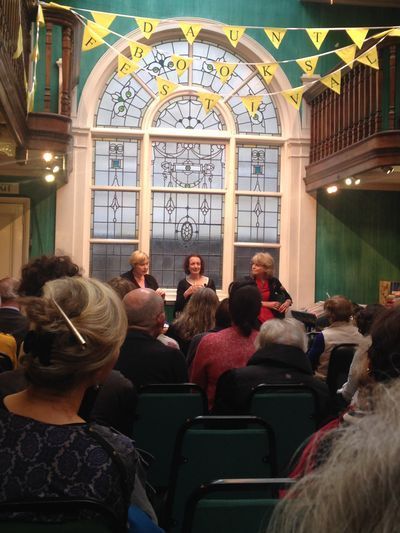There’s a heroine
By ROZ DINEEN
Daunt Books’s Marylebone store was looking particularly charming this morning, decked out in yellow bunting for the second Daunts Festival. The brilliant Alex Clark, Samantha Ellis and Anne Sebba took to the stage; their topic: "Choosing your heroines".
Ellis’s consideration of the female heroic began, in a way, on a walk with a friend to Top Withens (“it was properly wuthering all the way up”). Climbing, they argued about who was the better heroine – Kathy of Wuthering Heights or Jane Eyre. Ellis was all for Kathy, but at the peak she faltered, asking herself, “have I always chosen the wrong heroine?”. Here began her bibliomemoir, How to Be a Heroine.
As a biographer of women’s lives, Sebba has explored all sorts of heroics, and performed them, too. “Like a rescue mission” was how she described going after Wallis Simpson’s story. Many had Wallis down as a fantastical character, “a one-dimensional-Nazi-whore-prostitute-witch”. But she’s a “nuanced” heroine to Sebba. Other subjects, such as Jennie Churchill and Laura Ashley, “kept the marriage together, kept the home together, it’s not fashionable, but there are heroic aspects to that”.
The thing is, as Clark pointed out, we think we know what our heroines stand for, but on re-examination we often find we had it wrong. Through hearing of these writer’s processes of rereading and rescuing, we learnt this morning that new heroines can rise (and fall) out of old, familiar stories.
Who, for example, would think of Scarlett O’Hara as first and foremost an altruist, and Rhett a feminist? Yet this is exactly what Ellis found on returning to Gone with the Wind (and she added a delicious detail: that its author, Margaret Mitchell, was wrapped in a Votes for Women scarf as an infant by her suffragette mother and taken on marches).
Sebba is working now on a book about women in Paris in the Resistance and the risky things they did (a grenade in the baby’s pram, anyone?), which they later dismissed as adjuncts to the men’s activities. Inevitably the panellists accepted how many of our old heroine’s stories end where marriage begins.
Are things moving away from this model?
Yes, Ellis said: “and I think it’s always been there, we’ve just been distracted by the marriage plot”.
Here Ellis recalled the tale of Scheherazade – remember how the King married a new virgin every night, and killed her the next morning, until Scheherazade volunteered herself, “for her sisters”? She kept the king from killing her and the other women, by telling him tantalizing stories every night, for 1,001 nights (and you can read more on Visions of the Arabian Nights, in the TLS, here). Now there’s a heroine. “I hope we’re going back a bit”, Ellis said. The mainstream marriage plot may have pushed our real heroines into genre fiction, but it’s quite possible that they are pushing back.
Finally, do we still present our daughters with a feminine ideal, Clark asked – one that involves beauty, grace, elegance, rather than heroism?
“I have two daughters”, said Sebba, “and I try to tell them what matters is what you say, and do, and believe and not how you look.”
To which Clark replied: “You say it, but does everyone else say it back to them?”
This was a fantastic event that of course took in a great deal more than can be mentioned here (like Wallace Stegner, and E. M. Forster, and this, and this and Buffy).
The Daunts Festival runs until Friday night. A full programme of events can be found here.
This post was amended at 17.55pm. It was Rhett Butler not (thank goodness) Brett Butler who, frankly, etc.
Peter Stothard's Blog
- Peter Stothard's profile
- 30 followers




